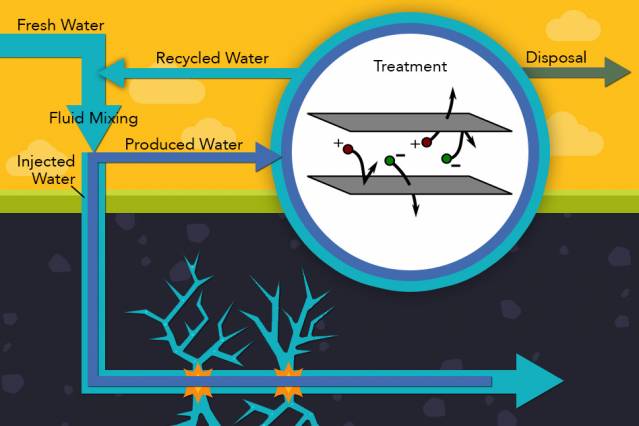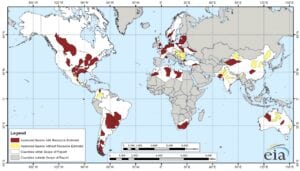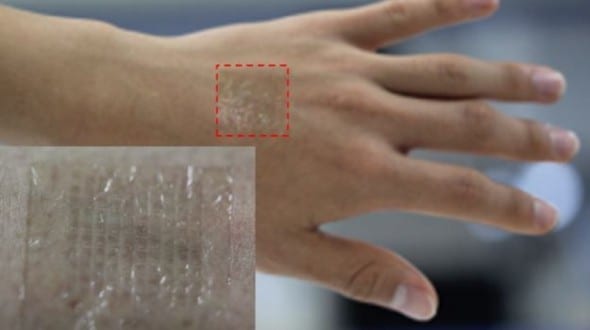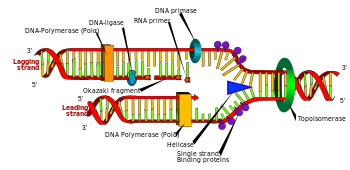
Illustration: Jose-Luis Olivares/MIT (inset image courtesy of the researchers)
Study shows electrodialysis can provide cost-effective treatment of salty water from fracked wells.
The boom in oil and gas produced through hydraulic fracturing, or fracking, is seen as a boon for meeting U.S. energy needs. But one byproduct of the process is millions of gallons of water that’s much saltier than seawater, after leaching salts from rocks deep below the surface.
Now researchers at MIT and in Saudi Arabia say they have found an economical solution for removing the salt from this water. The new analysis appears this week in the journal Applied Energy, in a paper co-authored by MIT professor John Lienhard, postdoc Ronan McGovern, and four others.
The method they propose for treating the “produced water” that flows from oil and gas wells throughout their operation is one that has been known for decades, but had not been considered a viable candidate for extremely high-salinity water, such as that produced from oil and gas wells. The technology, electrodialysis, “has been around for at least 50 years,” says Lienhard, the Abdul Latif Jameel Professor of Water and Food as well as director of the Center for Clean Water and Clean Energy at MIT and King Fahd University of Petroleum and Minerals (KFUPM).
The research team also included graduate student Adam Weiner, graduate student Lige Sun, and undergraduate Chester Chambers at MIT, and Professor Syed Zubair at KFUPM.
“Electrodialysis is generally thought of as being advantageous for relatively low-salinity water,” Lienhard says — such as the brackish, shallow groundwater found in many locations, generally with salinity around one-tenth that of seawater. But electrodialysis also turns out to be economically viable at the other end of the salinity spectrum, the new analysis shows.
The Latest on: Fracking
[google_news title=”” keyword=”fracking” num_posts=”10″ blurb_length=”0″ show_thumb=”left”]
via Google News
The Latest on: Fracking
- Digging deeper: Human-induced seismic events and how they can be preventedon May 8, 2024 at 4:53 am
These are earthquakes triggered by various human activities, like hydraulic fracturing (or fracking), reservoir impoundment, mining, geothermal energy extraction, and underground nuclear tests.
- Baptists and Bootleggers: Petrostates love American environmentalismon May 7, 2024 at 7:25 pm
Twelve years ago, the big petrostates saw fracking as a real threat. “The unconventional oil revolution being witnessed in North America could have dire consequences for the region,” reported MEED, a ...
- Bacteriophages could revolutionize fracking wastewater treatmenton May 7, 2024 at 4:35 pm
New research shows bacteriophages can target specific bacteria in fracking wastewater, offering an efficient treatment solution.
- Fracking Sand Buy Write On Atlas Energy Solutions Offers 42% Annualized Return Potentialon May 7, 2024 at 8:54 am
If we earn the $0.22 per share divdiend next week, and if AESI closes above $22.50 at expiration on June 21, we would be assigned and earn $1.12 per share on $21.60 per share at risk, or 5.19%. Over a ...
- 'Fracking the System: Colorado's Oil and Gas Wars' film releasedon May 5, 2024 at 10:37 pm
A new film documents the 2018 battle between Colorado environmentalists and the oil and gas industry over proposed fracking regulationsThe film also documents a grassroots effort by Co ...
- Fracking waste wells owned by an Ohio senator are leaking. The state paid $1.3 million to clean it upon May 4, 2024 at 2:30 am
COLUMBUS, Ohio – Injection wells owned by an Ohio state senator leaked fracking waste deep underground in Noble County before blasting through the surface miles away at an oil well, warranting a $1.3 ...
- Ohio attorney general wants Pa. company held in contempt for failing to clean up radioactive fracking wasteon May 3, 2024 at 12:33 pm
The company, along the Ohio River, was found to have radioactive liquids and sludge on the floor of its facility, among other "egregous" violations.
- A virus could help save billions of gallons of wastewater produced by frackingon April 30, 2024 at 7:58 am
An estimated 168 billion gallons of wastewater—or produced water—is generated annually by the Permian Basin fracking industry, according to a 2022 report by the Texas Produced Water Consortium. The ...
- Athens Co. fracking leak, inaction show the dire public health dangers of Ohio regulatory captureon April 30, 2024 at 1:30 am
Let’s say you, like roughly 45% of Ohioans, rely on groundwater wells to provide a constant supply of clean, safe drinking water. Now suppose, unbeknownst to you, an exceptionally toxic cocktail of ...
- Fracking: Minister wants NI ban on petroleum explorationon April 28, 2024 at 10:28 pm
The economy minister has said he wants to ban fracking and all other forms of petroleum exploration and production in Northern Ireland. Conor Murphy said he will soon ask the Executive to approve a ...
via Bing News










